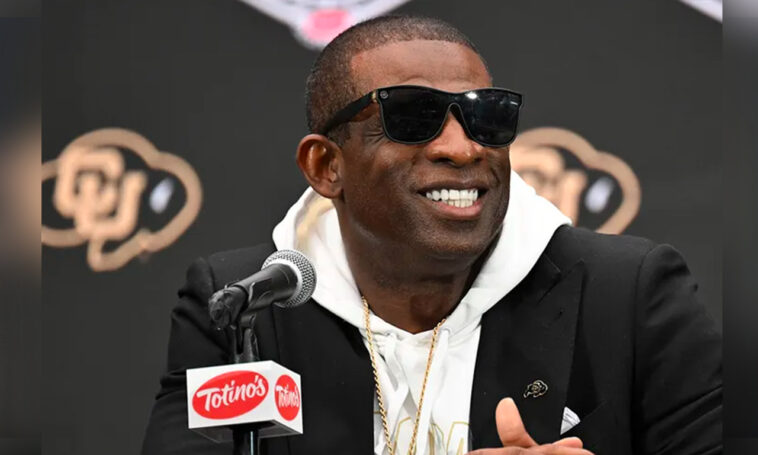In a controversial move, Colorado University has banned Sean Keeler, a columnist for the Denver Post, from asking questions of football coach Deion Sanders and other members of the football program. The university confirmed this decision on Friday, following what they describe as “sustained, personal attacks” on Sanders and the football program.
According to a statement provided to ESPN by the Colorado Athletic Department, the decision was made in conjunction with the football program. The statement read, “After a series of sustained, personal attacks on the football program and specifically Coach Prime, the CU Athletic Department in conjunction with the football program, have decided not to take questions from Denver Post columnist Sean Keeler at football-related events.”
“What happened to get you like this?” Deion Sanders asked Sean Keeler.
Keeler will still be allowed to attend football-related activities as a credentialed member of the media, and other reporters from the Denver Post are welcome to ask questions of the football program’s personnel, including coaches, players, and staff. However, Keeler’s direct interaction with Sanders and his team has been indefinitely barred.
The decision to ban Keeler follows two weeks of tension between the columnist and Sanders. At a recent press conference, Sanders accused Keeler of “always being on the attack” and questioned what led the reporter to his critical stance. “What happened to get you like this?” Sanders asked. When Keeler attempted to steer the conversation back to football, Sanders refused to engage, opting instead to move on to a reporter who inquired about his birthday plans.
Keeler’s articles have included references to Sanders as “Deposition Deion,” the “Bruce Lee of B.S.,” and a “false prophet.” He also coined terms like “Planet Prime,” “the Deion Kool-Aid,” and “circus” in his descriptions of the coach and his program. These phrases were cited by the Colorado Athletic Department as part of their justification for the ban.
In his column following the contentious press conference, Keeler described Sanders as “A confident man who suddenly looked and acted and sounded … afraid.” This depiction, along with his previous critiques, may have contributed to the university’s decision to restrict his access.
The ban on Keeler has sparked discussions about media freedom and the role of journalism in sports. Denver Post sports editor Matt Schubert took to social media to express his concerns, stating, “It’s well within anyone’s right to not take questions from [Denver Post sports reporters and columnists]. The reasons listed here by CU, however, are entirely subjective. It would be more accurate to say, ‘We don’t like Sean Keeler’s critiques of our program.'”
When asked for further clarification, a Colorado sports information staffer confirmed that Keeler had not violated any specific media policies. This has led some to question whether the ban is an appropriate response or an attempt to silence critical voices.
This is not the first time Sanders has been involved in a media controversy. In 2021, as the head coach at Jackson State, Sanders was instrumental in barring a reporter from the Mississippi Clarion Ledger from covering the team at the Southwestern Athletic Conference media day. This came after the newspaper published a story related to a court filing about an incoming recruit charged with assaulting a woman.
As Sanders gears up for his second season as Colorado’s head coach, the controversy surrounding his relationship with the media continues to grow. The Buffaloes, who finished last in the Pac-12 last season with a 4-8 record, begin their new season against North Dakota State on Thursday.
This article underscores the ongoing tension between Deion Sanders and the media, particularly with those who are critical of his coaching style and program management. The ban on Sean Keeler raises important questions about the balance between media freedom and a coach’s right to manage their public image.




